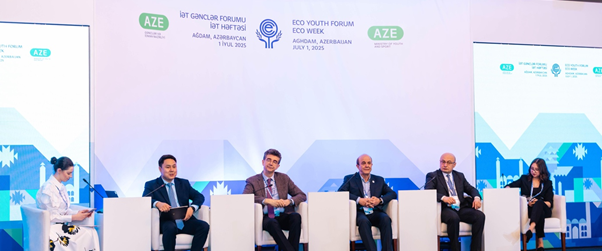ECOSF contributed the First ECO Youth Forum as part of the ECO WEEK and 17th ECO Summit in Azerbaijan
Aghdam, July 1, 2025 – The Economic Cooperation Organization (ECO) in partnerhsip with Republic of Azerbaijan successfully hosted the First ECO Youth Forum in Aghdam under the theme “Enhancing the Role of Youth for Building a Sustainable and Climate-Resilient Future.” The event brought together young leaders, policymakers, and experts from across the ECO Member States to foster inclusive dialogue and shape future-oriented policy recommendations in line with the ECO Vision 2035.

The ECO Youth Forum was hosted by Ministry of Youth and Sports Affairs of Azerbijan, focused on raising awareness among young leaders about regional development challenges and opportunities, promoting collaboration, and formulating actionable recommendations. Delegates engaged in in-depth discussions across three thematic areas: Economic and Trade Cooperation, Sustainability and Technology, and Human Development and People-to-People Connectivity. H.E. Mr. Farid Gayibov, Minister of Youth and Sports delivered a welcome note as the Chief Guest of the Forum, where he underlined the critical role youth in economic development of Azerbaijan and the wider ECO region. Representing the ECO Science Foundation (ECOSF), President Prof. Seyed Komail Tayebi and Mr. Khalil Raza, Program Manager – Energy & Climate, played active roles in the Forum.

President ECOSF Prof. Tayebi participated in the high-level Plenary Panel on “The Role of Youth in Regional Development,” where he emphasized the transformative potential of youth and expressed appreciation to the Government of Azerbaijan and ECO Secretariat, particularly H.E. Dr. Asad Majeed Khan, Secretary General of ECO. Prof. Tayebi stressed the need to equip youth with skills in STEM, foster collaborative research, and create supportive innovation ecosystems as key drivers of sustainable prosperity.

Meanwhile, Mr. Khalil Raza led the Working Group on Sustainability and Technology, steering meaningful discussions on climate-resilient development, digital transformation, and the role of AI in accelerating regional sustainability goals. The working group’s outcomes contributed directly to shaping strategic inputs for the ECO Vision 2035.
Recommendations for the Working Group on Sustainability and Technology led by the ECO Science Foundation:
Working Group: Sustainability and Technology
Recommendations for ECO Vision 2026–2035
1. Institutionalize Youth Participation in Climate Policy
Gap: Address the existing participation gap by ensuring equitable opportunities for youth from diverse backgrounds to contribute to climate policy discussions.
Ensure meaningful and structured youth engagement in national and regional climate policy processes across the ECO Region—particularly in the design, implementation, and monitoring of more child sensitive and youth inclusive Nationally Determined Contributions (NDCs)—through formal mechanisms such as:
- National Youth Climate Councils of ECO Member Countries (making ECO Youth Ambassadors permanent advisory body)
- Taking note of existing and supporting new youth statements such as those drafted during LCOY conferences.
2. Accelerate Building of Climate-Resilient Technologies through ECO-wide Innovation Platforms
Challenge: Climate resilience demands innovation, localization, and enhancement of technology infrastructure. Hence for getting meaningful impact from the ECO Youth Leaders, they should consider:
- Invest in green infrastructure and technologies, diversify their energy and industries with more clean energy sources particularly in high-emission intensity countries in the ECO Region.
- Align national technology deployment and energy transition plans of ECO Member Countries with SDG-7 Goal (affordable, renewable and clean energy for all) targets ensuring the transparency in tracking, monitoring, and controlling the emissions.
- Launch an Annual ECO Clima-Tech Hackathon, offering mentoring, seed funding, and incubation support for youth-led startups focused on climate resilience and interdisciplinary collaboration (Climate Scientists, UI/UX Designers, Artists, Engineers, Activists).
3. Mainstream Climate Education and Green Digital Engagement
Behavioral change and environmental literacy start with education and engagement—especially when linked to the technology used by youth. Hence, ECO Countries and Leaders should:
- Integrate Climate change education across all levels and disciplines (not just science) in the ECO region.
- Encourage and introduce Gamified digital platforms and AI tools in the ECO region to track carbon footprint at the individual/community level, encouraging behavioural change
- Promote the use of trusted social media campaigns (bloggers) to combat misinformation and raise awareness on regional climate challenges and solutions in the ECO region.
